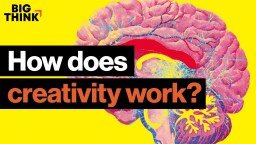Neuropsych
All Stories
fMRI scans show each new thing you think of as a “thought worm.”
Can thinking about the past really help us create a better present and future?
Watch The Daily Show comedian Jordan Klepper and elite improviser Bob Kulhan live.
▸
with
How a study on worms pointed the way towards a treatment for dementia.
Chronic irregular sleep in children was associated with psychotic experiences in adolescence, according to a recent study out of the University of Birmingham’s School of Psychology.
Are we genetically inclined for superstition or just fearful of the truth?
▸
13 min
—
with
Do we really know what we want in a romantic partner? If so, do our desires actually mean we match up with people who suit them?
A study of the manner in which memory works turns up a surprising thing.
The coronavirus pandemic has brought out the perception of selfishness among many.
Human brains evolved for creativity. We just have to learn how to access it.
▸
12 min
—
with
With the most common form of female sexual dysfunction impacting 1 in 10 women, this important study dives into how to keep a relationship going despite having different needs and wants in the bedroom.
According to a licensed clinical psychologist, we need to change the way we define narcissism in order to recognize it more clearly for what it really is.
The banality-of-evil thesis was a flashpoint for controversy.
If you’re interested in reinvention and adaptability, turns out Italian cooking is an instruction manual for life.
▸
with
What are the chances that an online connection will lead to true love?
Unraveling the mysteries of adult neurogenesis may have clinical applications.
It turns out, letting your partner know you appreciate them leads to a stronger relationship. Who’d have thunk?
A 2017 University of Wisconsin-Madison study was the first of it’s kind to show structural differences in the psychopathic brain.
Research suggests we need to create a new kind of work-life balance to prevent burnout while working from home.
Reveri Health has launched a new stress-relief self-hypnosis program through Amazon Alexa to help combat the anxiety of COVID-19.
Did you know that shifting to a positive perspective on aging can add 7.5 years to your life? Or that there is a provable U-curve of happiness that shows people get happier after age 50?
▸
01:02:06 min
—
with
Robert Whitaker discusses the long-term impact of prescription medication.
A good apology can do great things. A bad one can cause trouble. Know the difference.
A specialized MRI sensor reveals the neurotransmitter’s influence on neural activity throughout the brain.
Light therapy might help your natural circadian rhythm and even stave off seasonal depression.
Could better teaching practices make paying attention easier for everyone?
A groundbreaking Stanford University study explains the areas of the brain that are impacted by hypnosis.
Ever want to move forward but find you’re in your own way?
A 12-year long study examines the differences between how same-sex and different-sex couples argue, with some surprising results.
Just before I turned 60, I discovered that sharing my story by drawing could be an effective way to both alleviate my symptoms and combat that stigma.





























